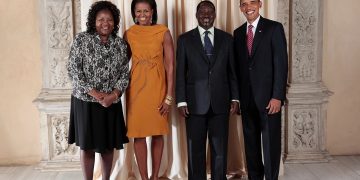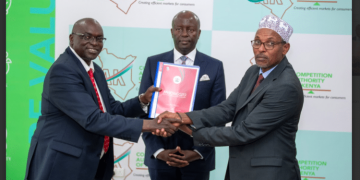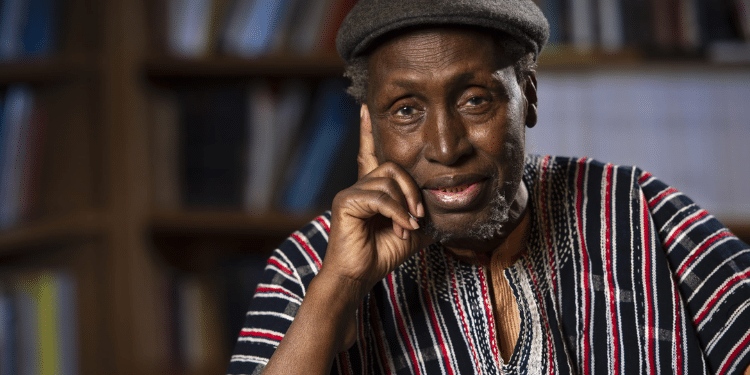Ngũgĩ wa Thiong’o, a towering figure in African literature and a lifelong champion for language, cultural freedom, and social justice, died Wednesday morning, May 28, 2025, at the age of 87.
His family said he had battled health complications, including kidney issues and limited mobility in recent years.
Born in 1938 in Kamiriithu, near Limuru, in Kenya’s Kiambu District, Ngũgĩ emerged as one of Africa’s most influential literary voices.
Over a career spanning six decades, he published novels, plays, essays, and children’s books that reshaped the landscape of postcolonial literature and challenged the legacy of colonialism in Africa.
Career
Educated in Kenya, Uganda, and the United Kingdom, Ngũgĩ studied at Alliance High School and Makerere University before earning a degree at the University of Leeds.
His academic career included positions at the University of Nairobi, where he led efforts to decolonize the English department, and visiting posts at Northwestern University, Yale, and New York University.
Additionally, he served as distinguished Professor of English and Comparative Literature at the University of California, Irvine.
A defining moment in his life came in 1977, when the Kenyan government detained him without charge after the performance of Ngaahika Ndeenda (I Will Marry When I Want), a politically charged play co-written in his native Gikuyu.
While in jail at Kamiti Maximum Security Prison, he made the radical decision to abandon English in favor of Gikuyu for his creative writing.
Also Read: Profile of Tundu Lissu: Shot 16 Times During Magufuli’s Time, Jailed Under Samia Suluhu Rule
His novel Devil on the Cross, originally written on prison toilet paper, emerged from this period.
Growth of Ngũgĩ wa Thiong’o in Literature
Ngũgĩ’s rise to prominence began in the early 1960s while studying at Makerere University College in Kampala, Uganda, where his debut play, The Black Hermit, was staged during Uganda’s independence celebrations in 1962.
His first novel, Weep Not, Child, published in 1964, was the first English-language novel by an East African.
It was followed by The River Between (1965) and A Grain of Wheat (1967), the latter marking a shift in style and focus from individual to collective experiences of history and resistance.
Family
Ngũgĩ wa Thiong’o married his first wife, Nyambura, in 1961 while he was still studying at Makerere University.
Details about Nyambura’s personal life remain largely private, as Ngũgĩ has consistently maintained a boundary between his family and public life.
The couple had six children namely Thiong’o, Kimunya, Nduchu, Mukoma, Wanjiku, and Njoki.
Years later, while living in exile in the United States, Ngũgĩ met Njeeri wa Ndung’o at New York’s Grand Central Station in 1989.
They married in 1992, signaling a new chapter in his personal journey. Njeeri, who worked as a counselor and served as the director of Human Resource Faculty and Staff Conflict Resolution Services at the University of California, Irvine, provided grounding and support during a difficult period in his life.
Fight for Freedom
Ngũgĩ was released in 1978 following international outcry, including pressure from Amnesty International, but was later forced into exile in 1982 under Daniel arap Moi, a strongman who ruled Kenya for 24 years.
He lived in Britain and the United States for over two decades, during which his books were banned from Kenyan educational institutions.
While abroad, he survived an assassination attempt in Zimbabwe and continued to speak and write prolifically, remaining an outspoken critic of political repression and neocolonial structures.
He returned to Kenya in 2004 after the end of the Moi dictatorship but was attacked during his visit.
Also Read: George Koimburi Profile: Education Background, Politics, Career and Net Worth
Despite this, he remained committed to Kenyan and African cultural expression, advocating for the use of African languages in literature and education.
Ngũgĩ’s literary legacy
Ngũgĩ’s literary legacy includes such acclaimed novels as Petals of Blood (1977), Matigari (1986), and Wizard of the Crow (2006), a sprawling political satire widely regarded as a masterpiece.
His non-fiction works, including Decolonising the Mind (1986), Moving the Centre (1993), and Penpoints, Gunpoints, and Dreams (1998), are considered foundational texts in postcolonial studies.
He also edited several literary journals, including Penpoint, Zuka, and Mutiiri, and remained active as a public intellectual, delivering lectures at institutions such as Oxford, Cambridge, and Harvard.
He was the recipient of numerous honors, including the 2001 Nonino International Prize for Literature and over ten honorary doctorates.
Ngũgĩ’s daughter, Wanjiku wa Ngũgĩ, announced his passing on social media, “It is with a heavy heart that we announce the passing of our dad, Ngũgĩ wa Thiong’o, this Wednesday morning, May 28, 2025. He lived a full life, fought a good fight. As was his last wish, let’s celebrate his life and his work.”
Follow our WhatsApp Channel and X Account for real-time news updates.







![[Live Blog] Thousands Line Up For Raila’s Final Viewing At Mamboleo A Photo Of Kneyans Viewing The Body Of Raila Odinga At Mamboleo. Photo/Citizen](https://thekenyatimescdn-ese7d3e7ghdnbfa9.z01.azurefd.net/prodimages/uploads/2025/10/a-photo-of-kneyans-viewing-the-body-of-raila-odinga-at-mamboleo.-photocitizen-360x180.png)




































































